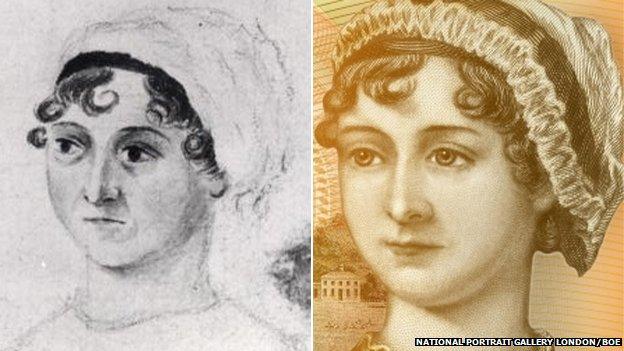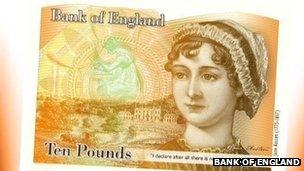Jane Austen banknote portrait 'airbrushed', says biographer
- Published

The new banknote will use an 1870 portrait (right) rather than a version by her sister Cassandra, circa 1810
A Jane Austen biographer has criticised the Bank of England for selecting an "airbrushed" portrait of the author for its new £10 note.
Oxford University fellow Dr Paula Byrne said the 1870 image was a "makeover" of an earlier portrait composed by the novelist's sister Cassandra.
But the Jane Austen Society, which was consulted by the Bank of England, felt it was a good choice.
The Hampshire-born writer was chosen to replace Charles Darwin on the £10 note.
It is expected to come into circulation from 2017.
Dr Byrne, author of The Real Jane Austen, said the chosen image made Austen look like "a pretty doll with big doe eyes".
"It's a 19th Century airbrushed makeover," said the fellow.
'Amateur portrait'
"It makes me quite angry as it's been prettied up for the Victorian era when Jane Austen was very much a woman of Georgian character.
"The costume is wrong and the image creates a myth Austen was a demure spinster and not a deep-thinking author.

The new note will feature Jane Austen and a short quote from one of her works
"She was edgy for her time and the portrait by her sister Cassandra depicts an intelligent, determined woman."
Elizabeth Proudman, chairman of the Jane Austen Society, said the Bank of England had done the best it could.
"There is only one authentic image available of Jane Austen and that is the pencil sketching by her sister that hangs in the National Portrait Gallery.
"It's an amateur portrait and, at the time, nobody particularly liked it.
"But, Jane Austen's fame and popularity grew after her death and an engraving of Cassandra's portrait was produced by [William Home] Lizars to go inside her memoirs.
"The family chose it, feeling it was a strong resemblance and that is more or less the image which has been chosen."
In a statement, the Bank of England said the banknote portrait was an 1870 engraving commissioned by Austen's nephew, James Edward Austen Leigh, adapted from the original Cassandra sketch.
Jane Austen was born on 16 December, 1775 in the village of Steventon in Hampshire. She died in Winchester on the 18 July, 1817.
The selection of the author for the £10 note removed the prospect of having no women, besides the Queen, on the UK's currency.
- Published4 October 2013
- Published24 July 2013
- Published24 July 2013
- Published27 June 2013